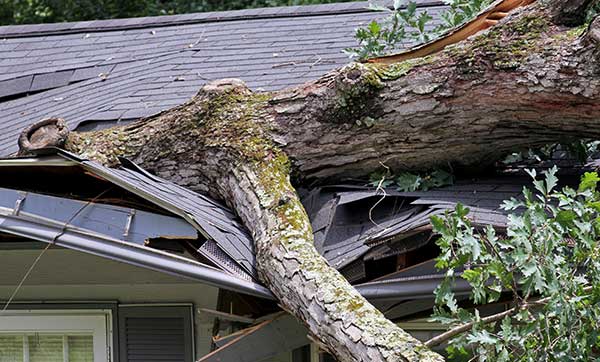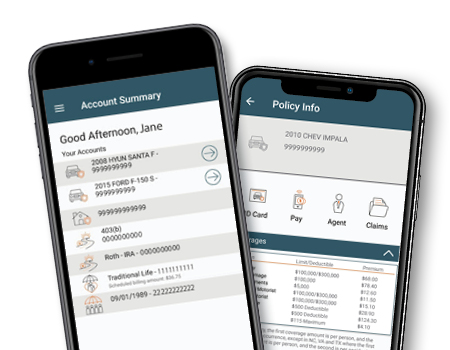Claims Center
We strive to make the process easy with our Distinctive Customer Service - and help you when you are in need.

The fastest and easiest way to file a claim is to start your claim online. Refer to our claims checklist for steps to take if your home or property is damaged.
The fastest and easiest way to file a claim is to start your claim online. Refer to our auto claims checklist for steps to take immediately following an accidents.
Call 800-356-9601 to file a waiver of premium or disability claim.
How to prepare for a natural disaster
Disasters typically strike without notice and can leave a path of destruction in their wake. But you can take precautions to reduce the chance of damage or injury.
First, build a family emergency preparedness kit. Then, read the following information to help you prepare before a catastrophe happens.
Resources
-
Earthquakes
While most people associate earthquakes with the West Coast, in reality they can occur anywhere across the United States. The Federal Emergency Management Agency (FEMA) has identified five steps to take to prepare for an earthquake:
- Check for hazards in your home that might break, move, fall off or unlatch during an earthquake.
- Educate yourself and your family (e.g., how to call 911, how to turn off gas and water).
- Identify safe places to seek shelter inside and outside of the home.
- Prepare a disaster kit.
- Develop an emergency community plan.
For more earthquake preparedness tips, visit FEMA’s website.
-
Flood
According to the American Red Cross, floods happen more frequently and are more costly than most other natural disasters in the United States. But you can stay safe by:
- Listening to local radio and television weather reports regarding flood watches or warnings;
- Being prepared to evacuate your home with little notice;
- Moving to higher ground if a flood or flash flood warning is issued for your area;
- Avoiding driving on flooded roadways, and paying special attention at night when flooded areas are harder to see; and
- Keeping children out of standing water.
For more tips, visit the American Red Cross’ website.
-
Hurricanes
While the hurricane seasons runs from June 1 through November 30, hurricanes can happen year-round. The National Hurricane Center recommends developing a family disaster plan that identifies:
- An area in your home to post emergency contact numbers.
- An evacuation plan and a location to meet once you've left your home.
- Locations where you can leave your pets.
- If you don't evacuate, a safe room in your home for each hurricane hazard.
- Your flood insurance is current.
For more information on preparing for hurricane risks and what action to take when alerted by emergency officials, visit the National Hurricane Center’s website or ready.gov.
-
TornadosA tornado is an extremely violent windstorm that can devastate an area in seconds. While tornados most frequently strike the South, Southwest and Midwest, every state is at risk. The peak season for tornadoes is from March through May for the southern states, and late spring through summer for more northern states. Often, tornadoes accompany tropical storms and hurricanes as they move onto land.
The most important thing to remember is that when you hear a tornado warning, seek shelter immediately in an interior room, away from windows, and on a lower-level floor if possible. If you're traveling in a vehicle, pull over and lay flat in a ditch for protection.
For more information on how to prepare for a tornado and stay safe when one strikes, visit the American Red Cross’ website. -
Wildfires
Wildfires are a growing natural hazard in most parts of the United States as more people build homes in wooded areas and forests. Wildfires can start from any number of sources, ranging from a cigarette left unattended to a lightning strike.
Although wildfires can start unnoticed and spread rapidly, you can take steps to reduce the chances of damage or injuries:- Find out the fire risk for your area.
- Always be ready to evacuate.
- Make safe zones around your house and property.
- Protect your house by removing excess debris from the exterior, using fire resistant siding and developing external water supply sources.
For more information on how to stay safe before, during and after a wildfire, visit FEMA’s website.
-
WindWinds from hurricanes, tornadoes and strong thunderstorms can tear roofs from buildings, crush walls, uproot trees and hurl debris.
You can protect your home from wind damage with some preparation, such as moving breakable items away from doors and windows. Other suggestions for safeguarding your home, such as bracing roof trusses or reinforcing garage doors, may require the advice of a contractor or other homebuilding professional.
For more information on the damage high winds can cause, visit the National Hurricane Center’s website. -
Winter stormsWhile the danger from winter weather varies across the country, almost every part of the United States experiences some winter weather each year. Severe winter weather can produce a destructive combination of extreme cold, heavy snowfall and strong winds producing blizzard-like conditions.
Winter storms can immobilize entire communities, knocking out power, heat and communications services for extended periods of time.
For information on how you can help protect your family from these life-threatening situations and your property from the damage winter storms can cause, visit FEMA’s website.
Featured blogs
.jpg)
Preventing water damage in your home
Water-related damage accounts for 45 percent of home owner claims, according to the Information Insurance Institute.
.jpg)
What homeowners (and renters) need to know about flood damage
Depending on where you live, when you think of a natural disaster that could cause serious damage to your home, you probably think of tornados, hurricanes or fires … but did floods ever cross your mind?

Build a family emergency preparedness kit
Part of planning for a disaster is assembling a family emergency preparedness kit.
The information provided here is for general informational purposes only. Horace Mann Insurance Company and its affiliates underwrite Horace Mann home insurance.
